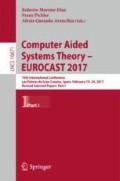Abstract
Genetic Programming (GP) schemas are structural templates equivalent to hyperplanes in the search space. Schema theories provide information about the properties of subsets of the population and the behavior of genetic operators. In this paper we propose a practical methodology to identify relevant schemas and measure their frequency in the population. We demonstrate our approach on an artificial symbolic regression benchmark where the parts of the formula are already known. Experimental results reveal how solutions are assembled within GP and explain diversity loss in GP populations through the proliferation of repeated patterns.
Access this chapter
Tax calculation will be finalised at checkout
Purchases are for personal use only
References
Affenzeller, M., Wagner, S.: Offspring selection: a new self-adaptive selection scheme for genetic algorithms. In: Ribeiro, B., Albrecht, R.F., Dobnikar, A., Pearson, D.W., Steele, N.C. (eds.) Adaptive and Natural Computing Algorithms, pp. 218–221. Springer, Vienna (2005). https://doi.org/10.1007/3-211-27389-1_52
Götz, M., Koch, C., Martens, W.: Efficient algorithms for descendant-only tree pattern queries. Inf. Syst. 34(7), 602–623 (2009)
Langdon, W.B., Banzhaf, W.: Repeated patterns in genetic programming. Nat. Comput. 7(4), 589–613 (2008)
Poli, R.: Exact schema theory for genetic programming and variable-length genetic algorithms with one-point crossover. Genet. Program Evolvable Mach. 2(2), 123–163 (2001)
Poli, R., Langdon, W.B., Dignum, S.: Generalisation of the limiting distribution of program sizes in tree-based genetic programming and analysis of its effects on bloat. In: Proceedings of the 9th Annual Conference on Genetic and Evolutionary, GECCO 2007, pp. 1588–1595. Press (2007)
Poli, R., Mcphee, N.F.: Covariant parsimony pressure for genetic programming (2008)
Poli, R., McPhee, N.F.: General schema theory for genetic programming with subtree-swapping crossover: part I. Evol. Comput. 11(1), 53–66 (2003)
Smart, W., Andreae, P., Zhang, M.: Empirical analysis of GP tree-fragments. In: Ebner, M., O’Neill, M., Ekárt, A., Vanneschi, L., Esparcia-Alcázar, A.I. (eds.) EuroGP 2007. LNCS, vol. 4445, pp. 55–67. Springer, Heidelberg (2007). https://doi.org/10.1007/978-3-540-71605-1_6
Vladislavleva, E.J., Smits, G.F., den Hertog, D.: Order of nonlinearity as a complexity measure for models generated by symbolic regression via Pareto genetic programming. IEEE Trans. Evol. Comput. 13(2), 333–349 (2009)
White, D.: An overview of schema theory. CoRR abs/1401.2651 (2014). http://arxiv.org/abs/1401.2651
Wilson, G.C., Heywood, M.I.: Context-based repeated sequences in linear genetic programming. In: Keijzer, M., Tettamanzi, A., Collet, P., van Hemert, J., Tomassini, M. (eds.) EuroGP 2005. LNCS, vol. 3447, pp. 240–249. Springer, Heidelberg (2005). https://doi.org/10.1007/978-3-540-31989-4_21
Winkler, S., Affenzeller, M., Burlacu, B., Kronberger, G., Kommenda, M., Fleck, P.: Similarity-based analysis of population dynamics in genetic programming performing symbolic regression. In: Genetic Programming Theory and Practice XIV. Genetic and Evolutionary Computation. Springer (2016)
Acknowledgements
The work described in this paper was done within the COMET Project Heuristic Optimization in Production and Logistics (HOPL), #843532 funded by the Austrian Research Promotion Agency (FFG).
Author information
Authors and Affiliations
Corresponding author
Editor information
Editors and Affiliations
Rights and permissions
Copyright information
© 2018 Springer International Publishing AG
About this paper
Cite this paper
Burlacu, B., Affenzeller, M., Kommenda, M., Kronberger, G., Winkler, S. (2018). Analysis of Schema Frequencies in Genetic Programming. In: Moreno-Díaz, R., Pichler, F., Quesada-Arencibia, A. (eds) Computer Aided Systems Theory – EUROCAST 2017. EUROCAST 2017. Lecture Notes in Computer Science(), vol 10671. Springer, Cham. https://doi.org/10.1007/978-3-319-74718-7_52
Download citation
DOI: https://doi.org/10.1007/978-3-319-74718-7_52
Published:
Publisher Name: Springer, Cham
Print ISBN: 978-3-319-74717-0
Online ISBN: 978-3-319-74718-7
eBook Packages: Computer ScienceComputer Science (R0)

